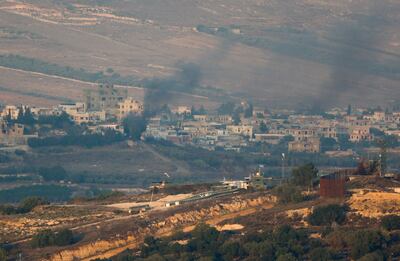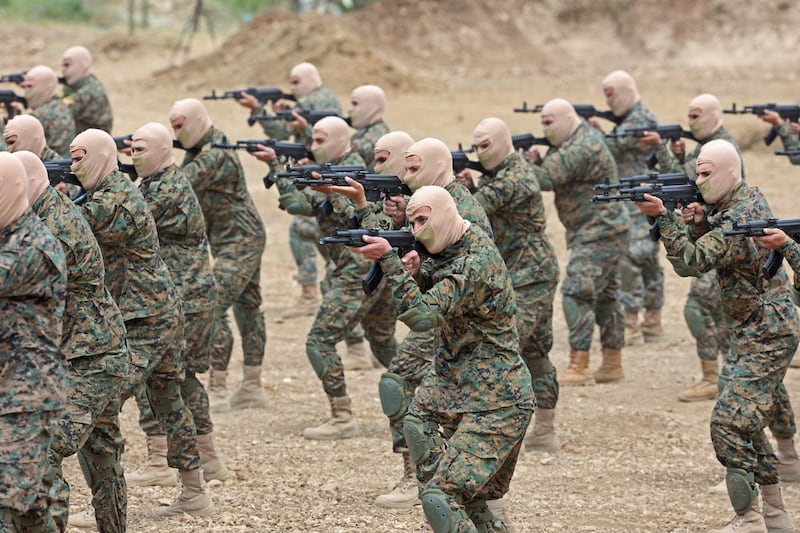Live updates: Follow the latest news on Israel-Gaza
Lebanon’s leaders, divided along political and sectarian lines, are known for agreeing on very few matters. But an intensifying border conflict with Israel and a significant number of civilian deaths has unified them on one issue: if Lebanon is dragged into all-out war, the state will have no choice but to defend itself.
“Lebanon was clear: we don’t have a desire for war but what is happening is an intensification by Israel, which is targeting civilians – and it’s a violation of the rules of engagement,” a source close to Parliament Speaker Nabih Berri told The National this week.
Mr Berri is also the leader of the Amal Movement, a political party tied to Hezbollah. Together, along with political allies, they make up almost half of the national parliament.
Hezbollah and allied armed groups have maintained a war of attrition against Israel since October 8, seeking to divert it from its assault on the Gaza Strip.
In an interview with Al Jazeera TV last week, interim Prime Minister Najib Mikati said he had assurances from Hezbollah that it would not take steps to ignite a war.
“But at the same time, we will not accept in any way an attack on Lebanon or on its lands and its citizens."
Despite the outward show of unity, some within Lebanon’s government have expressed resentment at being dragged into a war over which they have not been consulted.
“Unfortunately, the problem here is that this war is avoidable – if the Lebanese state were in control of its borders and of the decision to go to war or not,” MP and head of the Kataeb Party, Samy Gemayel, told The National.
Kataeb opposes Hezbollah as it perceives the Iran-backed group as a threat to Lebanon's sovereignty. Hezbollah's arms and extensive security apparatus have allowed it to operate parallel to the state, while also being represented in Lebanon's government and parliament.
“Hezbollah hijacked the right of the Lebanese people and its official institutions to decide how to deal with this threat,” Mr Gemayel said.
Lebanon currently has no president, no fully empowered government, and its parliament can function only in an electoral capacity until a head-of-state is voted in. In short, its ability to choose whether or not to go to war is limited.
With conflict intensifying on the border even Hezbollah’s most vocal opponents have stressed Lebanon’s right to defend itself against Israeli aggression.
“It’s a duty for any country to defend itself,” Mr Gemayel told The National. “It doesn’t need any institutional decision. When a country is attacked, it doesn’t say to the invader ‘please wait a sec, we need to convene the parliament’.”
Lebanon's army should be responsible for the country's defence, Mr Gemayel said. Still, "Hezbollah is in full control and bears the responsibility of the evolution of events because it is giving Israel the excuse to attack Lebanon. Lebanese people who will pay the price."

State doctrine 'legitimises Hezbollah'
“The Lebanese government is completely helpless to control its own crises or decide on war or peace because of the state doctrine,” said Karim Mufti, professor of international affairs at Sciences Po Paris.
A ministerial clause contained in every successive cabinet provides coverage and legitimacy for resistance and self-defence against aggression.
In a way, “state doctrine legitimates Hezbollah’s role”, Mr Mufti explained. Lebanon’s claim over the Shebaa farms, Kfarshuba Hills and the village of Ghajar, which Israel currently occupies, also gives Hezbollah leverage to launch attacks in the name of resistance, “allowing them to control the narrative”.
Israel’s targeting of Lebanese civilians has quietened even the most vocal opponents of Hezbollah. Even within the parliament, where the opposition has a majority bloc, “that doctrine is not being challenged, even from the radically opposed Hezbollah groups”, Mr Mufti explained.
“As long as Israel is attacking civilians, families, private property, hitting deeper into Lebanon, this glues the Lebanese together and shuts down opposition to Hezbollah.”
The militias of at least three political parties active in Lebanon’s governance are taking part in the border conflict – Hezbollah, Amal and the Islamic Group – giving leverage to Israel’s threats that it would hold not just Hezbollah but Lebanon’s leadership responsible for escalations on the frontier.
Hezbollah has also garnered support from the Lebanese Communist Party and the Syrian Socialist National Party.
Despite daily air strikes, full-scale warfare has so far been avoided.
In Lebanon at least 10 civilians have been killed in Israeli attacks since the eruption of the border conflict on October 8.
Israel acknowledges the death of three civilians on its side but does not always release updated death tolls.
Hezbollah’s attacks have largely remained limited to Israeli military sites, with leader Hassan Nasrallah promising “a civilian for a civilian” should Israel veer from the established rules of engagement. But early this month, Israel struck a moving car, killing three children and their grandmother in southern Lebanon – prompting promises of retribution from Hezbollah and a surprise visit from US envoy Amos Hochstein in an attempt to contain the conflict.
The disproportionate number of civilian deaths has brewed resentment among Lebanon’s political class, who say Israel is attempting to lure them into war.
The parliamentary source close to Nabih Berri warned that although the conflict is somewhat controlled it could still blow into a full-scale war.
Mr Hochstein’s visit to Lebanon carried a message to “stick to the rules of engagement”, the source said. “We told him: 'make sure Israel does the same'.”
MP Alain Aoun, a member of the Free Patriotic Movement, said that although the conflict appeared contained for the time being, more civilian deaths or attacks deeper into Lebanese territory would drag the country further towards all-out war.
“Lebanon will have to defend itself. We won’t have any choice.”







